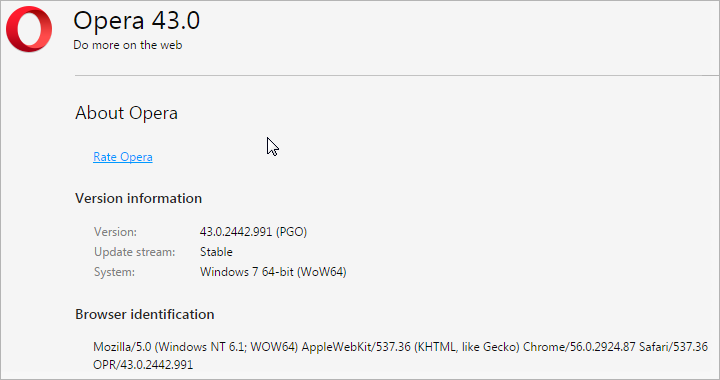Earlier today Opera Software released Opera version 43 based on Chrome/Blink 56. We just installed Opera 43 on all our platforms at Browserling. It's now available in our browser cloud for cross-browser testing!

Try Opera 43 in Browserling now!
Opera 43 adds the following new features:
Profile Guided Optimization (PGO) for Windows
A new performance feature called Profile Guided Optimization (PGO) was added. PGO is a compiler technique able to make programs working on Microsoft Windows significantly faster. With PGO, we can teach the compiler what usage scenarios are important so that Opera can perform those tasks even faster, using even less CPU.
Better Unicode handling
Non-whitespace Unicode control characters will now be rendered according to the specification, rather than being ignored.
Better HTTP Referrer-Policy security
The new Referrer-Policy HTTP header allows sites to forward site traffic by URL without leaking the user's session identifier or other private information.
Classic link selection returns
Opera 43 brings you classic link selection. With this feature, you are able select text in the link without triggering the link.
System-UI font family support
The new generic font family system-ui is now supported, which matches the platform's default UI font.
Less memory usage in canvas tag
ImageBitmapRenderingContext can be used to reduce memory consumption and compositing overhead by rendering pixel data in the form of an ImageBitmap.
New Keyboard event
The KeyboardEvent interface now supports the isComposing attribute which returns true if this event is fired between compositionstart and compositionend events.
Instant page loading
Instant page loading is a technology that predicts which website you're typing the address for. Once recognised, it begins loading the site in the background even before you hit enter. Instant page loading becomes smarter over time by learning which URL inputs led to a specific website.
Shadow DOM improvements
Shadow DOM's slotchange events bubble, but no longer re-fires, at a slot's assignedSlot.
New CSS Properties: Sticky CSS position and Pinch-zoom Touch-action
Opera now supports position: sticky, a new way to position elements. A position: sticky element is relatively-positioned, but becomes position: fixed after the user reaches a certain scroll position. This results in smoother scroll without jumps compared to trying to achieve the same thing with scroll events and JavaScript. Opera also now supports CSS property touch-action: pinch-zoom.
Audio/video improvements and changes
- ConstantSourceNode is a new audio source node that produces a constant output mixed with an AudioParam.
- Two Web Audio ChannelSplitterNode interface attributes are now read-only: channelCount, which is defined by numberOfOutputs in createChannelSplitter(), and channelCountMode, which is set to explicit.
- PannerNode.rolloffFactor now clamps to the nominal range of a PannerNode's distance model to describe the volume reduction rate as the source moves away from the listener.
- Support for FLAC is enabled within the FLAC and Ogg containers for the audio HTML element and decodeAudioData().
- OPUS can now be used with decodeAudioData(), expanding the variety of audio codecs supported by the Web Audio API.
Removed and deprecated features
- Non-script MIME types for external scripts (e.g., <script src="foo" type="something/something">) was deprecated (generated a message in the console) in Opera 42 and now in Opera 43 are no longer pre-fetched. This typically results in less wasted fetches. <script data-src="foo" type="something/something"> is recommended instead.
- The Web Audio API no longer includes the deprecated Doppler API, including speedOfSound, dopplerFactor, and setVelocity.
- RTCPeerConnection now accepts iceTransportPolicy as an RTCConfiguration parameter as well as iceTransports.
- RTCPeerConnection is now available without a webkit prefix, though webkitRTCPeerConnection still remains.
- The reflected-xss directive has been removed from Content Security Policy 2 since it was solely a wrapper for the X-XSS-Protection header and provided no additional functionality.
- Support for the MediaStreamTrack.getSources() method has been removed in favor of MediaDevices.enumerateDevices().
- The CSP referrer directive is no longer supported in favor of the new Referrer-Policy header mentioned above.
- Legacy CBC-mode ECDSA cipher suites ECDHE_ECDSA_WITH_AES_128_CBC_SHA and ECDHE_ECDSA_WITH_AES_256_CBC_SHA have been removed in favor of modern ciphers such as ECDHE_ECDSA_WITH_AES_128_GCM_SHA256.
- ECDSA with both SHA-1 and SHA-512 have been removed to reduce dependencies on SHA-1 and align with TLS 1.3's new ECDSA handling.
- MIDIMessageEvent.receivedTime has been deprecated in favor of Event.timeStamp, since Event.timeStamp now supports high-resolution monotonic time instead of epoch time.
Happy cross-browser testing in Opera 43!
Email this blog post to your friends or yourself!
Try Browserling!
Enter a URL to test, choose platform, browser and version, and you'll get a live interactive browser in 5 seconds!



 Subscribe to updates!
Subscribe to updates!
 BizSpark
BizSpark